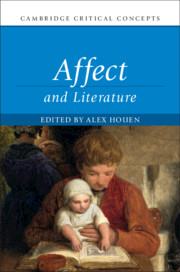Book contents
- Affect and Literature
- Cambridge Critical Concepts
- Affect and Literature
- Copyright page
- Contents
- Notes on Contributors
- Introduction
- I Origins
- Chapter 1 Poetic Fear-Related Affects and Society in Greco-Roman Antiquity
- Chapter 2 Secondary Affect in Lessing, Mendelssohn, and Nicolai
- Chapter 3 Affect and Life in Spinoza, Nietzsche, and Bergson
- Chapter 4 Feelings under the Microscope: New Critical Affect
- Chapter 5 ‘We Manufacture Fun’: Capital and the Production of Affect
- Chapter 6 Jacques Lacan’s Evanescent Affects
- Chapter 7 The Durability of Affect and the Ageing of Gay Male Queer Theory
- Chapter 8 Affect, Meaning, Becoming, and Power: Massumi, Spinoza, Deleuze, and Neuroscience
- Chapter 9 Translating Postcolonial Affect
- Chapter 10 Making Sorrow Sweet: Emotion and Empathy in the Experience of Fiction
- II Developments
- III Applications
- Index
Chapter 8 - Affect, Meaning, Becoming, and Power: Massumi, Spinoza, Deleuze, and Neuroscience
from I - Origins
Published online by Cambridge University Press: 16 January 2020
- Affect and Literature
- Cambridge Critical Concepts
- Affect and Literature
- Copyright page
- Contents
- Notes on Contributors
- Introduction
- I Origins
- Chapter 1 Poetic Fear-Related Affects and Society in Greco-Roman Antiquity
- Chapter 2 Secondary Affect in Lessing, Mendelssohn, and Nicolai
- Chapter 3 Affect and Life in Spinoza, Nietzsche, and Bergson
- Chapter 4 Feelings under the Microscope: New Critical Affect
- Chapter 5 ‘We Manufacture Fun’: Capital and the Production of Affect
- Chapter 6 Jacques Lacan’s Evanescent Affects
- Chapter 7 The Durability of Affect and the Ageing of Gay Male Queer Theory
- Chapter 8 Affect, Meaning, Becoming, and Power: Massumi, Spinoza, Deleuze, and Neuroscience
- Chapter 9 Translating Postcolonial Affect
- Chapter 10 Making Sorrow Sweet: Emotion and Empathy in the Experience of Fiction
- II Developments
- III Applications
- Index
Summary
Brian Massumi and others, such as William Connolly, draw together a number of approaches into what becomes a syncretic whole in developing a version affect theory that depends upon a sharp distinction between affect and emotions, and which posits affect as autonomous from cognition. The key elements of this mix are Deleuze and Guattari, Spinoza, and theories of affect drawn from psychology and neuroscience. In recent times, there has been significant criticism of some of the foundational approaches taken by this model of affect theory. The most telling relate to how this model of affect theory reads science, as set out by Ruth Leys and Moira Gatens. Both of their critiques are addressed to the work of Brian Massumi and particularly the systems he sets out in the first chapter of Parables of the Virtual (2002). In this chapter I will attempt to do a number of things. Firstly, I will situate the critiques Ruth Leys and Moira Gatens make of Massumi. Secondly, I will work through a reading of Deleuze’s, as well as Deleuze and Guattari’s, use of the concepts of affect and intensity and how these relate to Massumi’s understanding of these terms. Finally, I will briefly discuss the work of cognitive scientist Antonio Damasio and how steps might be taken to the ‘new paradigm of affect theory’ that Leys considers is now essential.
- Type
- Chapter
- Information
- Affect and Literature , pp. 159 - 174Publisher: Cambridge University PressPrint publication year: 2020



